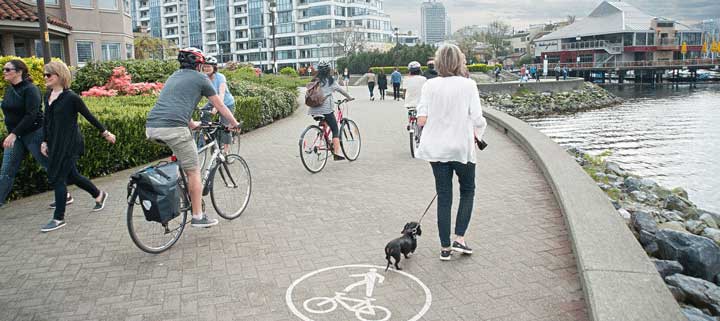When it comes to cities using policy to address the climate crisis, Vancouver is the city to watch — in North America anyway. The city's new "accelerated" "Climate Emergency Response" [PDF] — calling for carbon neutrality by 2050 — is setting the pace for climate action plans, committing to goals that are more ambitious than the leading U.S. cities.
The city wants two-thirds of all trips to be by walking, biking or transit by 2030. By that time, in just 11 years, the city hopes half the remaining vehicle trips will take place in low-emission vehicles.
Vancouver is already a clear leader compared to U.S. transportation policy. Already more than 50 percent of trips are by foot, bike and transit, thanks to smart investments in biking and transit infrastructure. But the city wants to do more. "Recognizing the climate emergency that the planet faces," the proposal would move the city's climate goals ahead by about 10 years.
According to the city's plan, carbon emissions in the city have been reduced by an average of 19,000 tons a year for the last 10 years. The city wants to accelerate the pace by five times.
Part of the savings will come from building efficiency improvements and from reforestation and shoreline restoration efforts. But the transportation stuff is pretty remarkable — and shows how limited even the most progressive U.S. cities' efforts are by comparison.
Walkability
Walkability is a big part of the strategy. The city estimates that about 13 percent of total emissions reductions could be achieved by increasing the number of trips people make on foot. Vancouver's new plan calls for 90 percent of the city's residents to "live within an easy walk/roll of their daily needs" by 2030.
About 45 percent of Vancouver residents currently live in what are considered so-called "complete neighborhoods," where residents have access to daycares and groceries and other things they need for day-to-day living.
Toward that end, the city plans to apply incentives for infill housing and density bonuses. Plans also call for introduced of e-bike share and accelerated construction of bike and pedestrian infrastructure.
On transit
Transit is a key part of the plan as well. The city expects 12 percent of the carbon reductions to come from increased transit use.
This will require, the city expects, "a spectrum of improvements, from local upgrades throughout the city, to completing major projects."
Those major projects include the extension of the SkyTrain — which services about 200,000 riders a day — to the University of British Columbia, a $3.8-billion transit project. The city also names bus rapid transit projects, like the 41st Avenue B-line, as important to the goal.
Vancouver wants to convert 15 percent of vehicle trips to transit, walking or biking every year. Toward that end, the city has outlined a variety of "accelerated actions," including "transportation pricing" — some form of congestion pricing — deprioritizing parking in city planning and introducing a pricing scheme for curbside loading zones. The city also plans to implement a city-wide transportation demand management program that would offer incentives to reduce driving for both parents of schoolchildren and workers.
Vehicle efficiency
Finally, of the vehicle trips that remain, Vancouver wants half to be by low-emissions vehicles by 2030. This will account for an estimated 24 percent of the plan's total reductions.
A big part of this strategy is adding electric vehicle charging infrastructure, of course. But the timeline is super aggressive. The city wants to have a "fast-charging network" complete by 2021. By 2023, the city's whole non-emergency fleet will be converted to EVs.
The city also wants to implement "parking policies that encourage and eventually require zero emissions vehicles" and "zero emissions zones that discourage and eventually ban polluting vehicles from specific areas or corridors." This is similar to what is happening in London with Ultra Low Emissions Zones where only electric vehicles are allowed to enter.
In its report, Vancouver city staff says all the 58 "accelerated actions" laid out in the report are "intended to be technically achievable, they will push the limits of what staff think can be accomplished in the next decade and staff realize that there will likely be political, financial and 'pace-of-change' challenges to their implementation."
Meanwhile, in the U.S. some of the boldest climate action plans -- like Minneapolis' -- are less ambitious. Minneapolis hopes to reduce driving miles by 40 percent by 2050, and reduce transportation emission 80 percent by that time. New York City wants to reduce carbon emissions by an identical amount over the same timeframe. New York hopes by 2050, 80 percent of trips will be by foot, bus, subway or bike.






